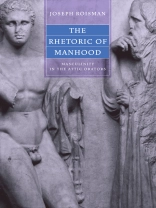The concept of manhood was immensely important in ancient Athens, shaping its political, social, legal, and ethical systems. This book, a groundbreaking study of manhood in fourth-century Athens, is the first to provide a comprehensive examination of notions about masculinity found in the Attic orators, who represent one of the most important sources for understanding the social history of this period. While previous studies have assumed a uniform ideology about manhood, Joseph Roisman finds that Athenians had quite varied opinions about what constituted manly values and conduct. He situates the evidence for ideas about manhood found in the Attic orators in its historical, ideological, and theoretical contexts to explore various manifestations of Athenian masculinity as well as the rhetoric that both articulated and questioned it.
Roisman focuses on topics such as the nexus between manhood and age; on Athenian men in their roles as family members, friends, and lovers; on the concept of masculine shame; on relations between social and economic status and manhood; on manhood in the military and politics; on the manly virtue of self-control; and on what men feared.
Table of Content
Preface
Abbreviations
Introduction
1. Manly Youth
2. The Roles and Responsibilities of the Adult Male: Kurios, Husband, Son, Kinsman, Friend, and Citizen
3. Manly Shame
4. Manhood and Social Standing
5. Man in the Military
6. The Struggle over Power
7. Men, Desires, and Self-Control
8. What Men Fear
Conclusion. Old Age and Manipulating Manhood
Works Cited
Index
About the author
Joseph Roisman, Professor of Classics at Colby College, is author of The General Demosthenes and His Use of Military Surprise (1993), editor of Alexander the Great: Ancient and Modern Perspectives (1995), and editor of Brill’s Companion to Alexander the Great (2003).












